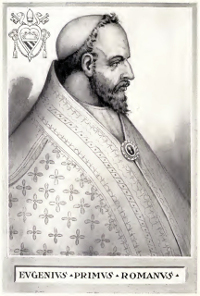
Feastday: June 2
Death: 657
Eugene I was a Roman priest who had held various positions in the Church and was known for his charity and his sanctity. He was consecrated Pope on August 10, 654, while his predecessor, Pope St. Martin I, was still alive (he died on September 6), an exile and prisoner in the Crimea by order of Monothelite Emperor Constans II. Martin is reported to have approved the election, but many believed Eugene was a puppet of Constans. Eugene soon asserted his independence by refusing the Emperor's demands that he acknowledge Peter as Patriarch of Constantinople and allow toleration of the Monothelites. Constans was furious, and only the capture of Rhodes by the Moslems in 654 and their defeat of Constans at the naval battle of Phoenix in 655 saved Eugene from sharing the fate of his predecessor. Eugene died in Rome on June 2. His feast day is June 2nd.
Pope Eugene I (Latin: Eugenius I; died 2 June 657) was the bishop of Rome from 10 August 654 to his death. He was chosen to become pope after the deposition and banishment of Martin I by Emperor Constans II over the dispute about Monothelitism.
Unusual election
Eugene was a Roman from the Aventine, son of Rufinianus. He was brought up in the Church's ministry, and was already an elderly priest when a dispute flared up between the papacy in Rome, which opposed the monothelite teachings, and the imperial government in Constantinople, which supported it. As a result, Pope Martin I was deposed by Emperor Constans II and carried off from Rome on 18 June 653, eventually ending up banished to Cherson. Little is known about what happened in Rome after Martin's departure, but it was typical in those days for the Holy See to be governed by the archpriest and archdeacon. Martin hoped that a successor would not be elected while he lived, but the imperial court exerted pressure on Rome through the exarch of Ravenna. On 10 August 654, Eugene was appointed the new pope. Martin, though disappointed, seems to have acceded. The imperial government believed that Eugene would be cooperative and ratified his election.
Pontificate
As pope, Eugene consecrated twenty-one bishops for different parts of the world and received the youthful Wilfrid on the occasion of his first visit to Rome (c. 654).
Eugene I showed greater deference than his predecessor to the emperor's wishes and made no public stand against the Monothelitism of the patriarchs of Constantinople. One of the first acts of the new pope was to send legates to Constantinople with letters to Emperor Constans II informing him of his election and professing his faith. The legates were deceived, or bribed, and brought back a synodical letter from Patriarch Peter of Constantinople (656–666), while the emperor's envoy, who accompanied them, brought offerings for Saint Peter and a request from the emperor that the pope would enter into communion with the patriarch of Constantinople. Peter's letter proved to be written in a difficult and obscure style and avoided making any specific declaration as to the number of "wills or operations" in Christ. When its contents were read to the clergy and people in the church of St. Mary Major in 656, they not only rejected the letter with indignation, but would not allow the pope to leave the basilica until he had promised that he would not on any account accept it.
The imperial officials were furious at this harsh rejection of the wishes of the emperor and patriarch. Constans threatened to dispose of Eugene just as he had disposed of Martin, but was preoccupied by defending the empire from the Muslim conquests.
Death and legacy
Eugene I died on 2 June 657, before Constans II could act against him. He was buried in Old St. Peter's Basilica. He was acclaimed a saint, his day being 2 June. He is commemorated as the patron and namesake of the Cathedral of Saint Eugene in the Diocese of Santa Rosa in California.





